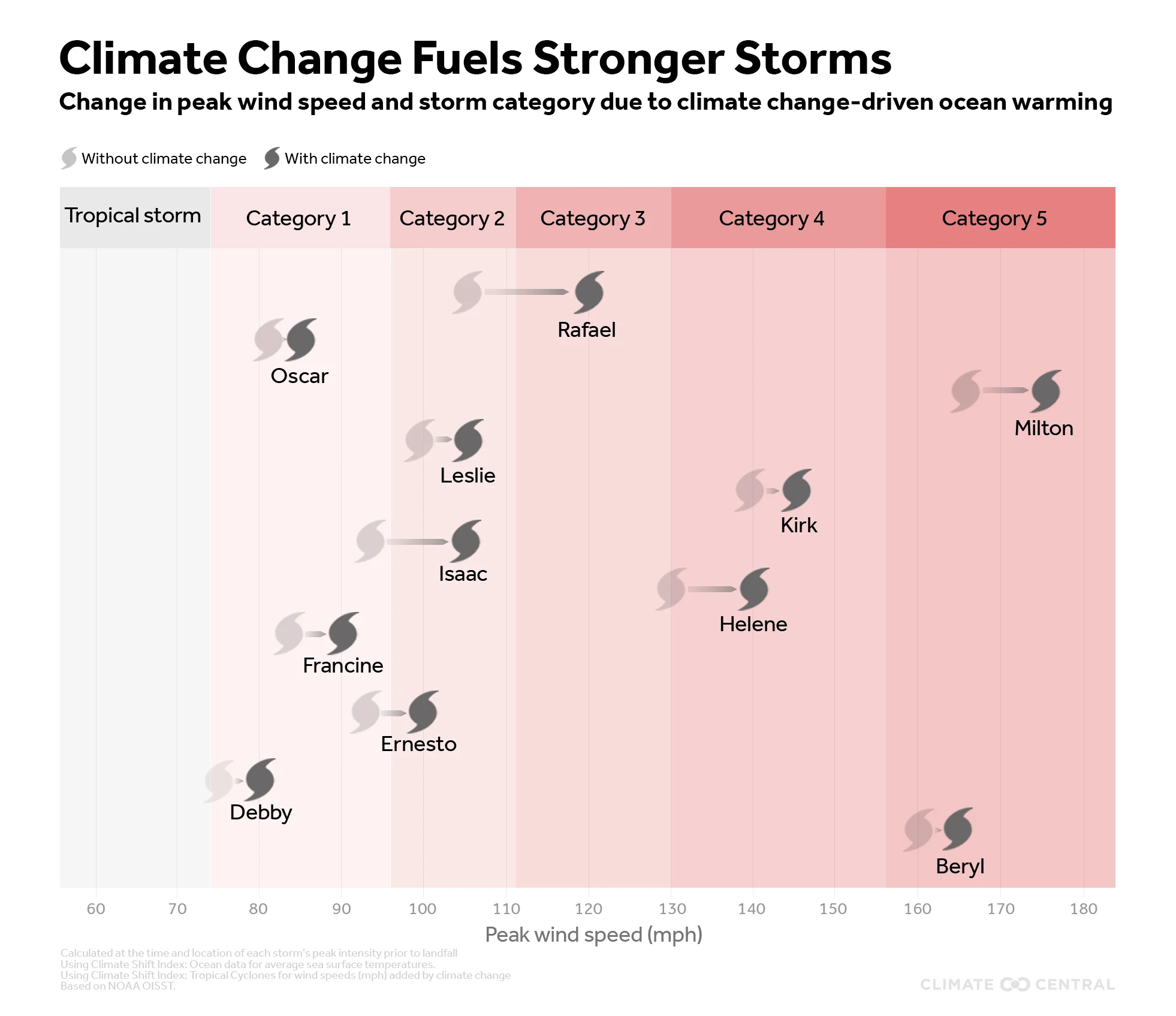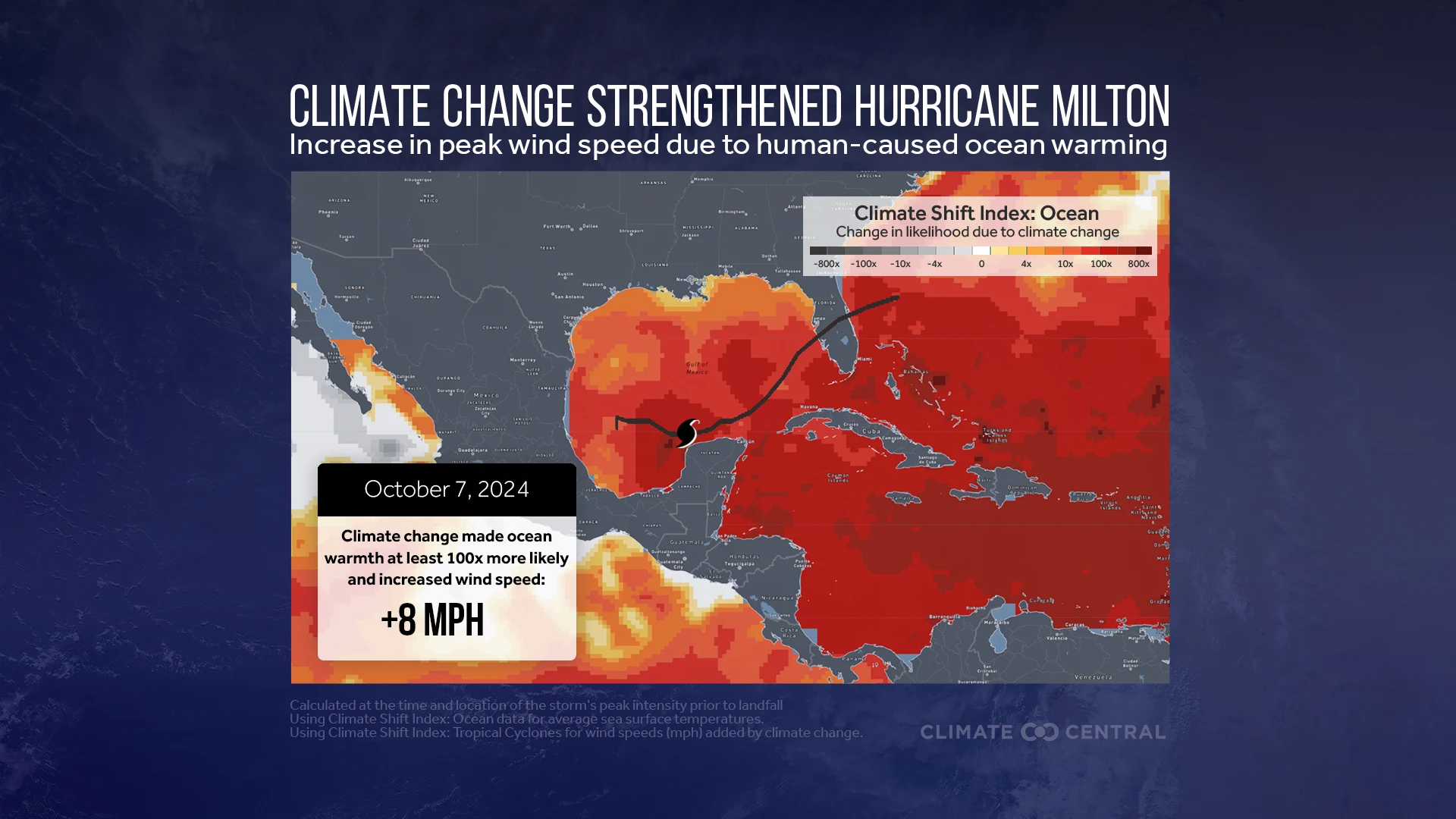Report•November 20, 2024
Climate change increased wind speeds for every 2024 Atlantic hurricane: Analysis
**Disclaimer (Updated July 2025)** |
|---|
Read the full report: Climate change increased wind speeds for every 2024 Atlantic hurricane: Analysis
Introduction
Climate change increased maximum wind speeds for every Atlantic hurricane in 2024, according to a Climate Central analysis based on new, peer-reviewed research. Human-caused global warming elevated ocean temperatures and boosted all eleven storms' intensities, increasing their highest sustained wind speeds by 3 to 14 miles per hour. This increase moved three of the hurricanes into a higher Saffir-Simpson Hurricane Scale category.
This analysis used the methodology from a new study published on November 20, 2024, in Environmental Research: Climate, which introduced a rapid attribution framework to assess the impact of human-caused ocean warming on hurricane intensities. The study, Human-caused ocean warming has intensified recent hurricanes (Gilford et al., 2024), applied this framework to Atlantic hurricanes from 2019-2023, and these findings cover the 2024 Atlantic hurricane season.
Key findings
All eleven hurricanes in 2024 intensified by 3-14 mph during the record-breaking ocean warmth of the 2024 hurricane season, strengthening over waters made as much as 2.5°F warmer because of climate change.
Climate change made elevated sea surface temperatures (SST) in the tracks of 2024 hurricanes up to 800 times more likely, according to the Climate Shift Index: Ocean.
Human-warmed ocean temperatures made major hurricanes Helene and Milton even stronger, adding 10 mph and 8 mph, respectively.

Hurricane | Maximum intensity | Increase in maximum intensity |
|---|---|---|
Beryl | 165 mph | 5 mph |
Debby | 80 mph | 5 mph |
Ernesto | 100 mph | 8 mph |
Francine | 90 mph | 7 mph |
Helene | 140 mph | 10 mph |
Isaac | 105 mph | 12 mph |
Kirk | 145 mph | 6 mph |
Leslie | 105 mph | 6 mph |
Milton | 175 mph | 8 mph |
Oscar | 80 mph | 3 mph |
Rafael | 120 mph | 14 mph |
Table 1. Observed hurricane maximum wind speeds (mph) at their lifetime maximum intensities and the increases in wind speed due to human-caused climate change for each storm during the 2024 Atlantic hurricane season.

Major funding provided by the Bezos Earth Fund.
---
As per our disclaimer at the top of this page, we previously released the following data and graphics based on a scientific method focused on how ocean warming influences hurricane intensities. Moving forward, our methods also account for a broader range of thermodynamic factors, including increases in atmospheric temperature and moisture. We’re showing the formerly shared data and graphics for transparency. |
|---|
Previously shared data and graphics using our outdated methods:
All eleven hurricanes in 2024 (as of November 10) intensified by 9-28 mph during the record-breaking ocean warmth of the 2024 hurricane season, strengthening over waters made as much as 2.5°F warmer because of climate change.
Climate change made elevated sea surface temperatures (SST) in the tracks of 2024 hurricanes up to 800 times more likely.
Human-warmed ocean temperatures made major hurricanes Helene and Milton even stronger, adding 16 mph and 24 mph, respectively.
Hurricane | Maximum intensity | Increase in maximum intensity |
|---|---|---|
Beryl | 165 mph | 18 mph |
Debby | 80 mph | 9 mph |
Ernesto | 100 mph | 18 mph |
Francine | 90 mph | 13 mph |
Helene | 140 mph | 16 mph |
Isaac | 105 mph | 28 mph |
Kirk | 145 mph | 20 mph |
Leslie | 105 mph | 18 mph |
Milton | 175 mph | 23 mph |
Oscar | 85 mph | 9 mph |
Rafael | 120 mph | 28 mph |


